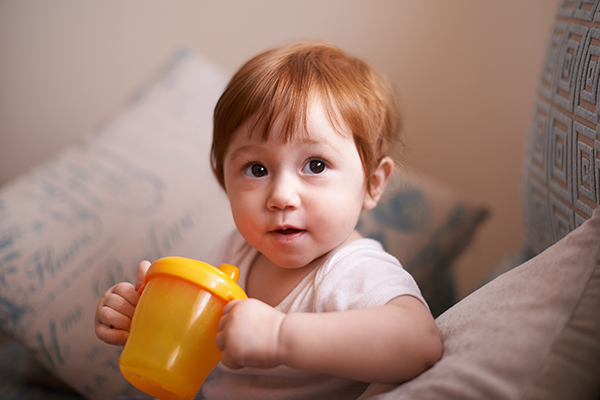Developmental Milestones: 10 to 12 Month Baby
10- to 12-Month-Old Developmental Milestones
10- to 12-month-old babies are learning a lot and showing interest in their surroundings. These months include some exciting milestones, as babies can now use their hands for support and begin to pull themselves into a standing position. Some babies might even start taking a few steps on their own.
Doctors use certain milestones to tell if a baby is developing as expected. There is a wide range of what’s considered normal, so some babies gain skills earlier or later than others. Babies who were born prematurely often reach milestones later. Always talk with your doctor about your baby’s progress.
How Much Will My 10- to 12-Month-Old Baby Grow?
While all babies may grow at a different rate, the following indicates the average for boys and girls 10 to 12 months of age:
- Weight: average gain of about 13 ounces each month, birthweight is doubled at approximately 4 to 5 months and tripled at one year
- Height: average growth of just over 1/2 inch each month with most infants growing 10 inches in the first year.
- Head size: average growth of about 1/2 inch each month
What Can My 10- to 12-Month-Old Baby Do at This Age?
As your baby continues to grow, you will notice new and exciting abilities that develop. While babies may progress at different rates, the following are some of the common milestones your child may reach in this age group:
- Pulls up to a standing position
- Can sit back down from standing position
- Cruises or walks around holding onto furniture
- May stand next to furniture without holding on
- May walk holding on to your finger or hand
- May begin to take steps and walk on own
- Plays ball by receiving and returning a rolled ball
- Able to pick up food and small objects with fingers
- Can feed self finger foods
- Drinks from cup with spout
- Can turn pages in a book, often several at a time
- Bangs objects together
- Imitates scribble
- New teeth continue to erupt; may have four to six teeth by one year old
- Takes two naps a day and is able to sleep up to 12 hours at night without a feeding
- Make wake up at night looking for parents

What Can My 10- to 12-Month-Old Baby Say?
Speech development is very exciting for parents as they watch their babies become social beings that can interact with others. While every baby develops speech at his or her own rate, the following are some of the common milestones in this age group:
- Says da-da and ma-ma and knows who these persons are
- Imitates sounds and some speech
- May say things like “Uh oh”
- Imitates animal sounds in response to questions (such as, “What does the cow say?”)
- Simple gesture (such as shaking head “no”)
What Does My 10- to 12-Month-Old Baby Understand?
Babies at this age become much more aware of others and themselves. They are not yet confident that their parent will return when they leave. Some common milestones children may reach in this age group are:
- Recognizes familiar objects and pictures in books, and may point to some objects when asked “Where is the … ?”
- Follows a one step command with the parent having to show the child how to do it
- Has preferences for people and toys, and may have a favorite toy or blanket
- Is curious and wants to explore
- Moves to music
- Drops objects on purpose for others to pick up
- Points and gestures for objects and actions
- May begin to pretend simple activities, such as cleaning or drinking from cup
Feeding Your 10- to 12-Month-Old Baby
Your baby may be trying a large variety of new foods and may want to try what you are eating. Start any new food with a trial run. Introduce only one new food at time, then wait a few days to a week to look for any allergic reactions. Try to introduce new foods during times when your pediatrician’s office is open, in case of allergic reaction.
If your baby shows signs of severe allergy, such as severe swelling of the face, lips or tongue or trouble breathing, call 9-1-1.
When trying new solid foods with your 10- to -12-month-old, try to avoid these ingredients:
Do not give a baby honey until after their first birthday. It can contain spores that are harmless to adults but can cause botulism in babies.
Do not give cow’s milk to your baby until over 12 months old. It doesn’t have the nutrition that infants need from breast milk or formula.
When exploring new foods with your baby, try foods that offer new tastes and textures. At this age, you can begin to have your infant join the rest of the family at meals and develop a routine of 3 meals a day.
By the time babies are around 9 or 10 months old, they usually have the dexterity and coordination to pinch smaller pieces of food between their forefinger and thumb so they can try feeding themselves. To prevent choking, cook table foods a little longer, until very soft, and cut them into pieces that your baby can handle safely.
By age one, babies are ready to switch from formula to cow’s milk. If you’re breastfeeding, you can continue beyond your infant’s first birthday, if desired. If you decide to stop breastfeeding before your baby’s first birthday, you should feed your baby iron-fortified formula. If your baby is over 12 months, you can offer whole milk.
If your baby uses a sippy cup, let him or her keep working on it. After 12 months, you can serve whole milk in a cup, which will help with the transition from the bottle. Using a bottle after 1 year of life can predispose children to developing cavities.

How Does My 10-12-Month-Old Baby Interact With Others?
Babies at this age have a better understanding of their relationship with others, such as when they are near or far, coming or going. While every child’s personality is unique, some of the common behavioral traits your child may show include:
- Fear and anxiety of strangers; may cling and clutch parents; cries when parent leaves
- Waves bye-bye
- Cries or shows emotions when told “no”
How Can I Help My 10- to 12-Month-Old Baby Overcome Separation Anxiety?
Consider the following as ways to foster the emotional security of your baby:
- Walk away for short periods while your baby plays in a safe area to help teach him or her that you will come back each time.
- Introduce your baby gradually to new people and things.
- Look at picture books with your baby and talk about the pictures. Consider ordering a custom book with names and faces of loved ones to help baby remember others.
How Long Should My 10-12-Month-Old Baby Sleep?
Sleep problems are common in the second half of a baby’s first year. Some babies may experience separation anxiety and call out or cry in the middle of the night, then calm down when mom or dad enters the room. This is a normal stage of development. If this happens, as with other waking, give your baby some time to settle down. If needed, give brief reassurance to your little one without taking your baby out of the crib.
Most babies this age sleep 12–16 hours per day, including a stretch of 9–12 hours at night. Your baby will likely still take two naps per day. Some babies nap for 30 minutes, while others nap for up to 2 hours.
See our healthy sleep for babies guide for more information about sleep at this age.
How Can I Help My 10- to 12-Month Old Baby Learn New Skills?
- Read stories to your baby every day.
- When your baby asks for something by pointing, name the object as you give it to them.
- Hold and cuddle your baby often.
- Continue a bedtime routine of cuddling, rocking and soothing.
- Give your baby finger foods and help them to use a spoon, but allow your baby to do it alone. Do not worry if your baby makes a mess, as experimentation is important for development.
- Respond to your baby if he or she awakens and cries at night, but avoid turning on the light or picking up or holding your baby. Limit your interactions to soothing talk and patting, telling your baby it is time for sleep.
- Give your child toys that move (such as balls or cars).
Reviewed by Dr. Gregory Kennedy, Southern Orange County Pediatric Associates, CHOC Primary Care – June 2021
Your child’s health is important at every stage. Visit CHOC Primary Care for pediatric services near you.
What's coming up for your child
Related articles for this age group
A CHOC pediatrician explains the causes of colic in babies, and offers tips to parents for helping their colicky baby.
When siblings Julissa and Joseph were diagnosed with the same rare congenital heart disease, CHOC stepped in to treat them both.
Should teens and preteens be using so many skincare products with fancy ingredients? A pediatric dermatologist answers parents’ questions.
11-year-old Isa had to relearn everything after treatment for FIRES, a rare epilepsy disorder. With help from CHOC rehab, he’s thriving.
A CHOC mental health expert demonstrates five coping tips for parents and caregivers through video, and discusses the importance of self-care.
A CHOC mental health expert helps parents guide their kids and teens through the loss of a family pet, and offers tips for dealing with grief.



















